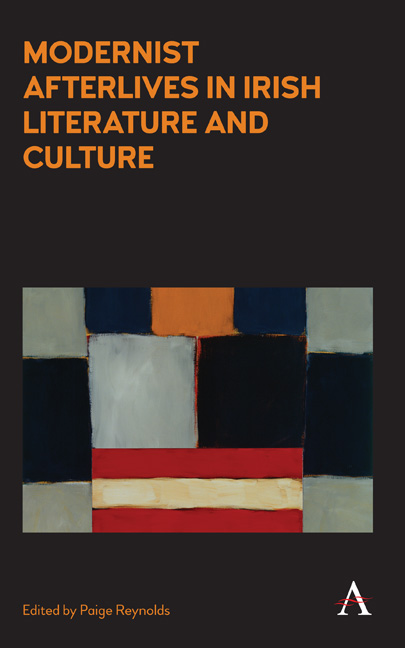Book contents
- Frontmatter
- Contents
- List of Figures
- Acknowledgements
- Introduction
- Section One LITERATURE AND LANGUAGE
- Chapter 1 ‘A World of Hotels and Gaols’: Women Novelists and the Spaces of Irish Modernism, 1930–32
- Chapter 2 ‘I Knew What It Meant / Not to Be at All’: Death and the (Modernist) Afterlife in the Work of Irish Women Poets of the 1940s
- Chapter 3 ‘Whatever Is Given / Can Always Be Reimagined’: Seamus Heaney's Indefinite Modernism
- Chapter 4 James Joyce and the Lives of Edna O'Brien
- Chapter 5 Modernist Topoi and Late Modernist Praxis in Recent Irish Poetry (with Special Reference to the Work of David Lloyd)
- Chapter 6 ‘Amach Leis!’ (Out with It!): Modernist Inheritances in Micheál Ó Conghaile's ‘Athair’ (‘Father’)
- Section Two INSTITUTIONS, ART AND PERFORMANCE
- Afterword: The Poetics of Perpetuation
- Notes on Contributors
- Index
Chapter 4 - James Joyce and the Lives of Edna O'Brien
from Section One - LITERATURE AND LANGUAGE
Published online by Cambridge University Press: 22 July 2017
- Frontmatter
- Contents
- List of Figures
- Acknowledgements
- Introduction
- Section One LITERATURE AND LANGUAGE
- Chapter 1 ‘A World of Hotels and Gaols’: Women Novelists and the Spaces of Irish Modernism, 1930–32
- Chapter 2 ‘I Knew What It Meant / Not to Be at All’: Death and the (Modernist) Afterlife in the Work of Irish Women Poets of the 1940s
- Chapter 3 ‘Whatever Is Given / Can Always Be Reimagined’: Seamus Heaney's Indefinite Modernism
- Chapter 4 James Joyce and the Lives of Edna O'Brien
- Chapter 5 Modernist Topoi and Late Modernist Praxis in Recent Irish Poetry (with Special Reference to the Work of David Lloyd)
- Chapter 6 ‘Amach Leis!’ (Out with It!): Modernist Inheritances in Micheál Ó Conghaile's ‘Athair’ (‘Father’)
- Section Two INSTITUTIONS, ART AND PERFORMANCE
- Afterword: The Poetics of Perpetuation
- Notes on Contributors
- Index
Summary
In Edna O'Brien's 2012 memoir, Country Girl, she recalls observing the Dublin literati of the 1950s, the Dublin of Patrick Kavanagh, Flann O'Brien and Austin Clarke, and she appears in one scene as a fascinated recorder of male anxieties of influence:
Joyce was constantly spoken of in these circles, and not always favourably. […] [Flann O'Brien], when asked if he resembled Joyce, would say “that nothing could be further from Detroit”, and that Finnegans Wake was a “wallet of literary underwear”. […] His harshest jibes, however, were for the Prairie Professors, Americans, talking through their “caubs” and descending on Dublin to write their theses on Herr Joyce. […]
This essay examines the politics of Joyce biography, the different anxieties of influence to be found in the history of writing Joyce's life, and explores why these matter to reading Edna O'Brien. The profound influence of the relationship of O'Brien and Joyce, between one of Ireland's most important contemporary writers and the dominant architect of Irish modernism, can be observed in her fiction. It appears, for instance, in the style and form of novels such as A Pagan Place (1970), in which O'Brien adopts Joycean techniques in translating the interior life of the novel's protagonist, and Night (1972), which can be read as an adaptation of Molly Bloom's soliloquy. But the affinities between these two writers are most dramatically played out in O'Brien's life writing, in her biography of Joyce and in Country Girl. In O'Brien's non- fiction, we can most readily observe her fascination with the life of Joyce and her critically alert interventions in the history of writing Joyce's life.
As O'Brien writes the life of Joyce, she engages with the different accounts of Joyce's life as generated by his family, colleagues and critics – accounts that constitute the multifaceted, and sometimes conflicting, corpus of Joyce biography. She navigates that history as a woman writer who shares a well-documented affinity with Joyce's work but, at the same time, she keeps a careful distance between her own creative life and Joyce's achievements. O'Brien takes up different subject positions in imagining his life and in casting Joyce as a character in her own life.
- Type
- Chapter
- Information
- Modernist Afterlives in Irish Literature and Culture , pp. 49 - 60Publisher: Anthem PressPrint publication year: 2016



